Sensitive issues need to be tackled diplomatically. However, if someone is super defensive, in complete denial, or flat-out refuses to take subtle and kind-hearted hints, it’s time for the direct approach. And just because you tell someone an uncomfortable truth doesn’t mean that you don’t care about them. More often than not, it’s the exact opposite.
Redditor u/bubblebassjoe brought up a very delicate issue with the AITA online community. She asked the members of the subreddit to share their opinions about how she handled a situation with her overweight sister.
The OP’s sister refuses to buy new clothes after getting heavier. Since she’s just started a new job, the author of the post believes that what she currently wears might impact her career in a very negative way. However, her sister got incredibly mad and accused her of body-shaming her. Scroll down for the full story and to see how the AITA community reacted to this. Do you have any strong opinions one way or the other, Pandas? Share your thoughts in the comments.
Talking about someone’s weight and the clothes that they wear can be very sensitive topics

Image credits: Artificial Photography (not the actual photo)
A woman shared how her overweight sister accused her of body-shaming her after she has a frank chat about her work clothes
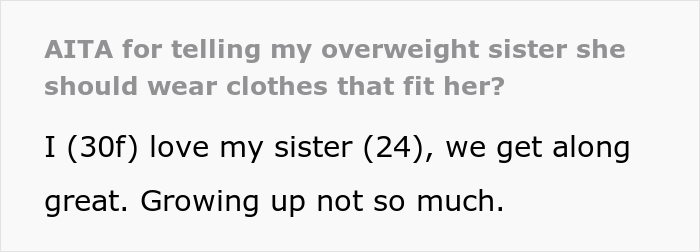
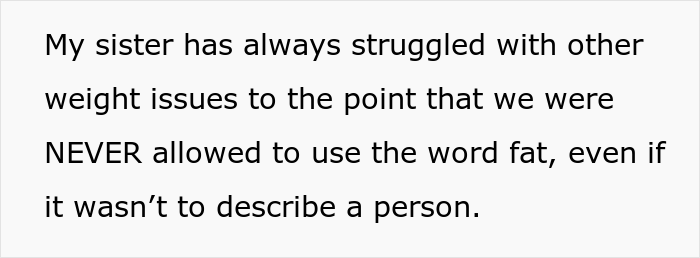



Image credits: Laura Tancredi (not the actual photo)






Image credits: bubblebassjoe
The rate of obesity in the United States is rising. 36.5% of adults are considered to be obese. Meanwhile, another 32.5% of adults are overweight. That means that two-thirds of the population are either overweight or obese.
The vast majority of AITA community members thought that the OP did the right thing by calling out her sister’s outfit. They also noted that what happened here definitely wasn’t body-shaming. Though a small minority thought that it was.
There are two core issues at work here. The first is that no matter how much we might all value freedom and self-expression, there are certain rules and expectations when an employee comes into the office. Some of these expectations include things that could apply to any social situation: good hygiene, neat clothes, polite manners.
The second issue is where someone draws the line when it comes to defining body-shaming. If someone humiliates someone because of their body size and shape and makes mocking comments about their weight, that’s definitely body-shaming. However, if someone is genuinely concerned for your health, your career, and your sense of dignity, it’s not necessarily that (even if it might feel bad or embarrassing to hear someone telling you that you need to make certain life adjustments).
Not every piece of criticism is done out of ill intent. Not every piece of criticism is automatically body shaming.
Most companies have clear dress codes set out for their employees. Obviously, some of them are ridiculously strict and some of the rules don’t even make much sense, but it’s part of that particular business’ long-standing traditions. Meanwhile, other companies have a far looser dress code, especially in the wake of the pandemic, remote and hybrid work. There’s a certain expectation to dress well when meeting clients and an understanding that you can wear pretty much what you like at other times… up to a certain point.
Now, that point actually lies in a bit of a grey area because everyone seems to have an opinion about what should and shouldn’t be allowed in the workplace.
We’ve covered the divisive issue that is body-shaming and body positivity time and again here at Bored Panda. During an earlier interview with personal trainer and physiotherapist Paulius Lipskis, the founder of the ‘Mes Geresni’ (‘We’re Better’) project, we learned more about loving ourselves as we are while also embracing change for the better.
The health expert noted that body positivity is very complex and a lot depends on the particular individual we’re talking about. He highlighted the fact that body positivity can be just as harmful as it can be helpful.
“Somebody could potentially use the body positivity movement as an excuse for their unhealthy habits, however, if the movement encourages you to accept and embrace yourself, it’s something that you should strive to follow. It’s also a problem if you view healthy living as something that you’re forced to do. If you’re constantly angry, tired, and you’re low on energy—it’s an issue,” health and fitness expert Paulius told Bored Panda, adding that real, long-lasting change springs from a desire to change from deep within; you can’t force someone to change if they don’t want to.
“Usually, our unhealthy habits are a result of constant stress and our behavior that’s meant to protect us from it. If we would have an honest chat with ourselves, we’d clearly see that we’re dissatisfied with ourselves only when we feel that we’re using our bad habits to cover our emotions. However, if we accept that we’re not perfect, we’re not pressured to change. That’s when you start developing a natural desire and curiosity to find out what the best possible version of you is.”
Meanwhile, Eva Wiseman wrote in The Guardian that the body positivity movement can increase the sense of guilt that overweight people feel. Instead, she advocates for finding peace with our bodies instead of loving ourselves as we are.
“While the body positivity movement celebrates all bodies that spill over the waistband of what is currently acceptable, it fails to illuminate the reasons why so many people have such bitter and violent relationships with their bodies to begin with,” she writes.
“By skipping those sticky conversations, ones that reach into the offal of politics and families, and the day-to-day existence of being a fat person in the world and instead leaping straight to the friendly hashtag, complete with women detailing their own blessed journeys towards inner beauty, it heaves all responsibility for feeling better about one’s body on to the shoulders of the person within it,” Wiseman continues.
“‘Everybody’s beautiful, and all bodies are perfect!’ said 2019, to a small murmur from those pointing out that the workplace, Tinder, fashion, and health professionals disagree. The effect, then, was a feeling of isolation, and a doubling of guilt. Guilt both for living in a body that doesn’t fit and for wanting to change it,” she says that it’s best to move from body positivity towards body neutrality.
Here’s how some internet users reacted after they read the entire story


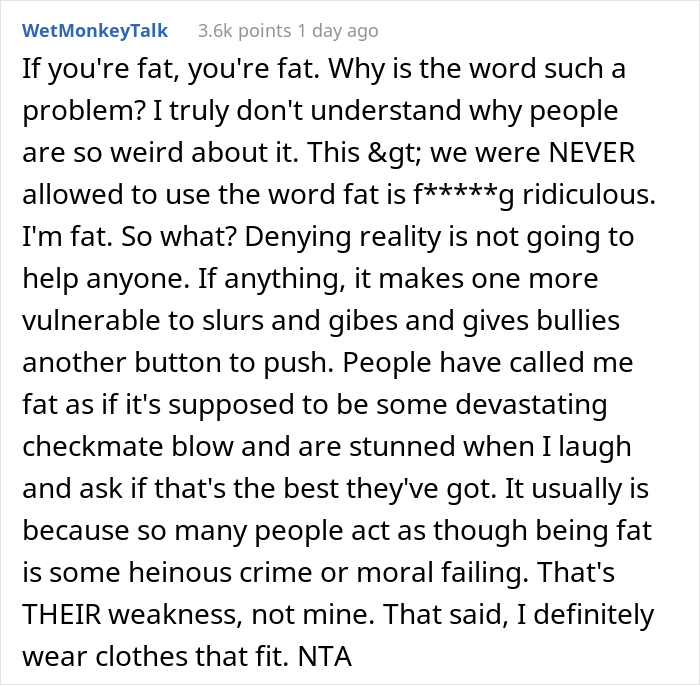
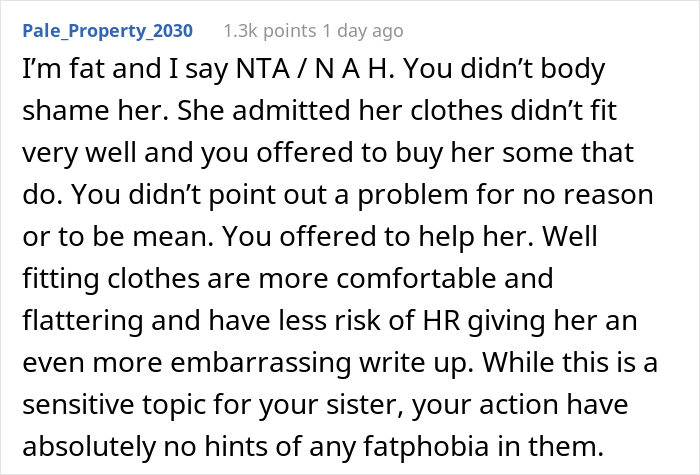


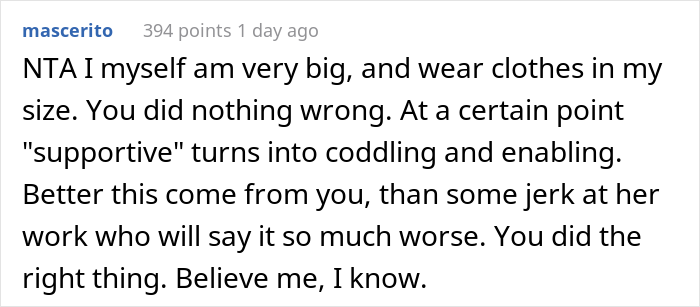
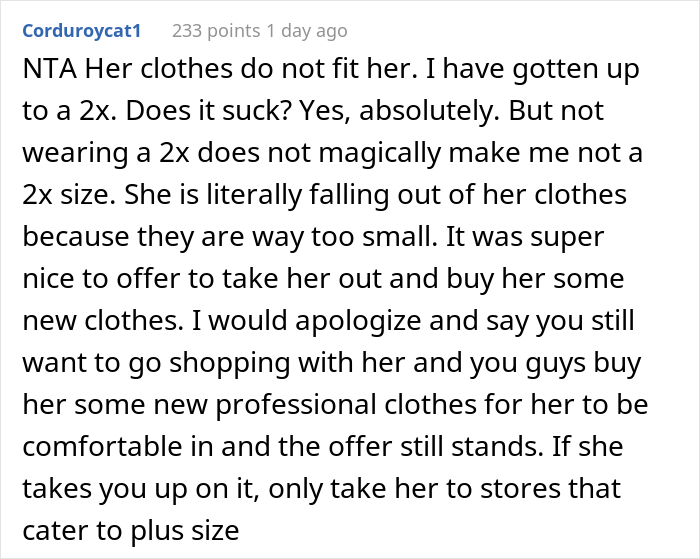

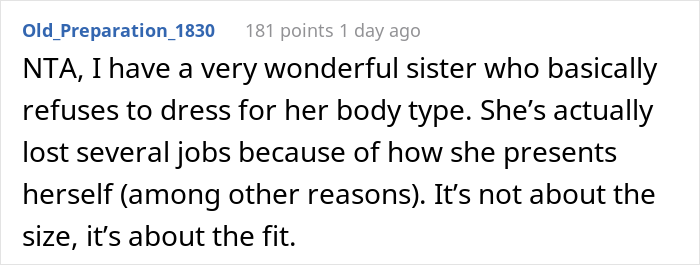
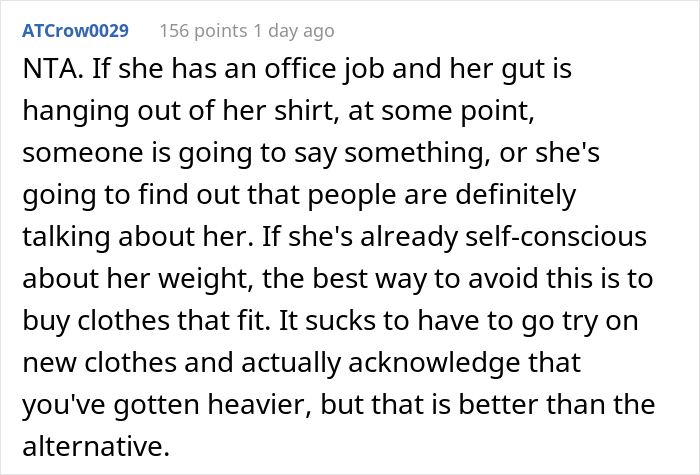

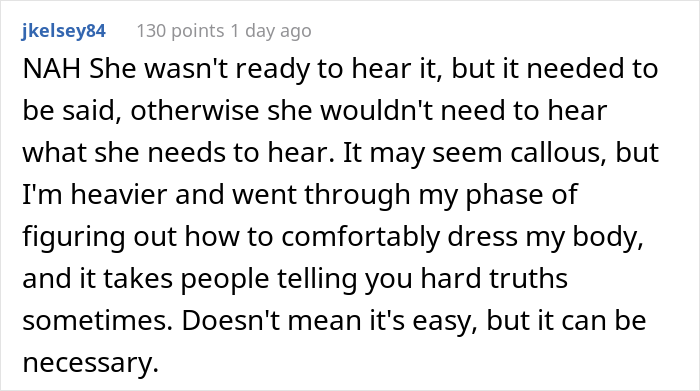
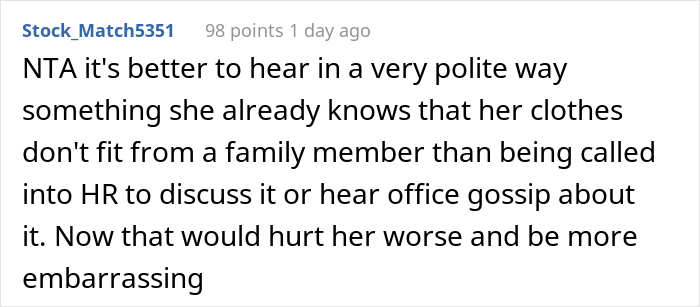

The post "Am I A Jerk For Telling My Overweight Sister She Should Wear Clothes That Fit Her?" first appeared on Bored Panda.
from Bored Panda https://ift.tt/KiQdSe3

